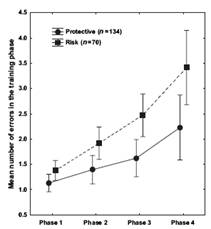Human Learning and Memory
Behavioral genetics of individual differences
The last few years have seen an explosive increase in our ability to identify human genes and to explore the way specific genes affect health and behavior. Most genes have two or more naturally-occurring variants (“alleles”), and these influence everything from our eye color to our risk for specific diseases. Alleles have been identified that confer risk for Alzheimer’s disease, Parkinson’s disease, post-traumatic stress disorder, and many other disorders.
In most cases, these alleles don’t directly cause a disorder, but merely increase an individual’s risk, making it more likely that a person will eventually develop the disorder. This means that other factors – other genes or other environmental conditions – must also play a role in triggering the disease. For example, alpha-synuclein (abbreviated SNCA) is a protein involved in regulating the brain chemical dopamine. The SNCA gene comes in several different alleles: some are “protective” against Parkinson’s disease, meaning that individuals who carry the allele are less likely to develop Parkinson’s disease; other alleles confer increased risk for the disease.
In collaboration with Mark Gluck (Rutgers University-Newark) and Szabolcs Kéri (University of Szeged, Hungary), SMBI researchers have examined learning and memory in individuals who carry different SNCA alleles – but who have no symptoms of Parkinson’s disease. On a task of sequence learning that is disrupted in Parkinson’s patients, asymptomatic individuals carrying “risk” alleles perform significantly worse than individuals carrying “protective” alleles. This suggests that some of the learning and memory deficits which appear in full-blown Parkinson’s patients may already be apparent in individuals who merely carry genetic risk for the disease.

On a test of sequence learning that is disrupted in patients with Parkinson’s disease, healthy (asymptomatic) carriers of a genetic variant that confers risk for Parkinson’s disease were impaired, relative to peers who carried an alternate variant that is protective against the disease. This suggests that some of the same cognitive impairments observed in patients with full-blown Parkinson’s may already be apparent in individuals who merely have genetic risk for developing the disease. Figure adapted from Kéri et al. (2008) Genes, Brain and Behavior, 7:31-36.
Another brain chemical that is important for learning is serotonin, which may be important in depression; many antidepressant drugs are believed to work by increasing brain levels of serotonin. Serotonin (like other brain chemicals) works by activating receptors on brain cells that in turn cause the target brain cell to modify its activity. One such receptor, called the serotonin Type 2A receptor (abbreviated 5-HT2AR), occurs on brain cells in areas such as the hippocampus that are important for learning and memory. Some individuals have a naturally-occurring allele of the 5-HT2AR gene that results in a slightly less effective version of the receptor. It has previously been shown that individuals carrying this allele are slightly but significantly impaired in hippocampal-dependent short-term recall of verbal information. In collaboration with Gluck and Kéri, we are investigating other hippocampal-dependent learning and memory tasks. For example, in prior work we have shown that humans with hippocampal damage can learn simple associations through trial and error; when tested on the previously-trained associations, they can perform as well as healthy controls, but they are severely impaired on the ability to generalize when familiar stimuli are presented in novel recombinations. In pilot work, we find that healthy young adults with the less effective 5-HT2AR allele show a similar pattern: good learning and good performance on previously-trained associations, but impaired performance on transfer to new recombinations. If this result holds up, it would suggest that this genetic variant could have small but measurable effects on how humans learn information and how well they can generalize that information to new situations.

Most individuals carry a common variant of the 5-HT2AR gene (His/His), but about 10-15% of the population carries a different variant of this gene (His/Tyr). Left: In pilot research, His/Tyr individuals can learn simple associations as well as His/His individuals. Right: When tested on previously trained (Old) information, His/Tyr individuals perform as well as His/His individuals, but they are significantly impaired at generalizing when familiar information is presented in novel combinations (New).
Understanding the ways in which naturally-occurring genetic variations affect learning and memory will help us to understand why otherwise healthy individuals have such wide variation in their learning and memory abilities, and why different people are biased to learn and remember information in slightly different ways. This research may also be important for understanding how some individuals’ biases in learning and memory may put them at risk for disorders such as depression, as well as understanding whether a particular patient’s genetic profile may help determine which medications will be most effective for that patient.
Representative Publications:
Kéri, S., et al. (2010 Aug 23. [Epub ahead of print]). Alpha-synuclein locus duplication impairs reward-learning. Proceedings of the National Academy of Sciences, USA, in press. Hyperlink to abstract: PMID: 20733075
Kéri, S., et al. (2008). Risk and protective haplotypes of the alpha-synuclein gene associated with Parkinson’s disease differentially affect cognitive sequence learning. Genes, Brain and Behavior, 7:31-36. Hyperlink to abstract: PMID: 17451452
Funding: National Institute of Mental Health
